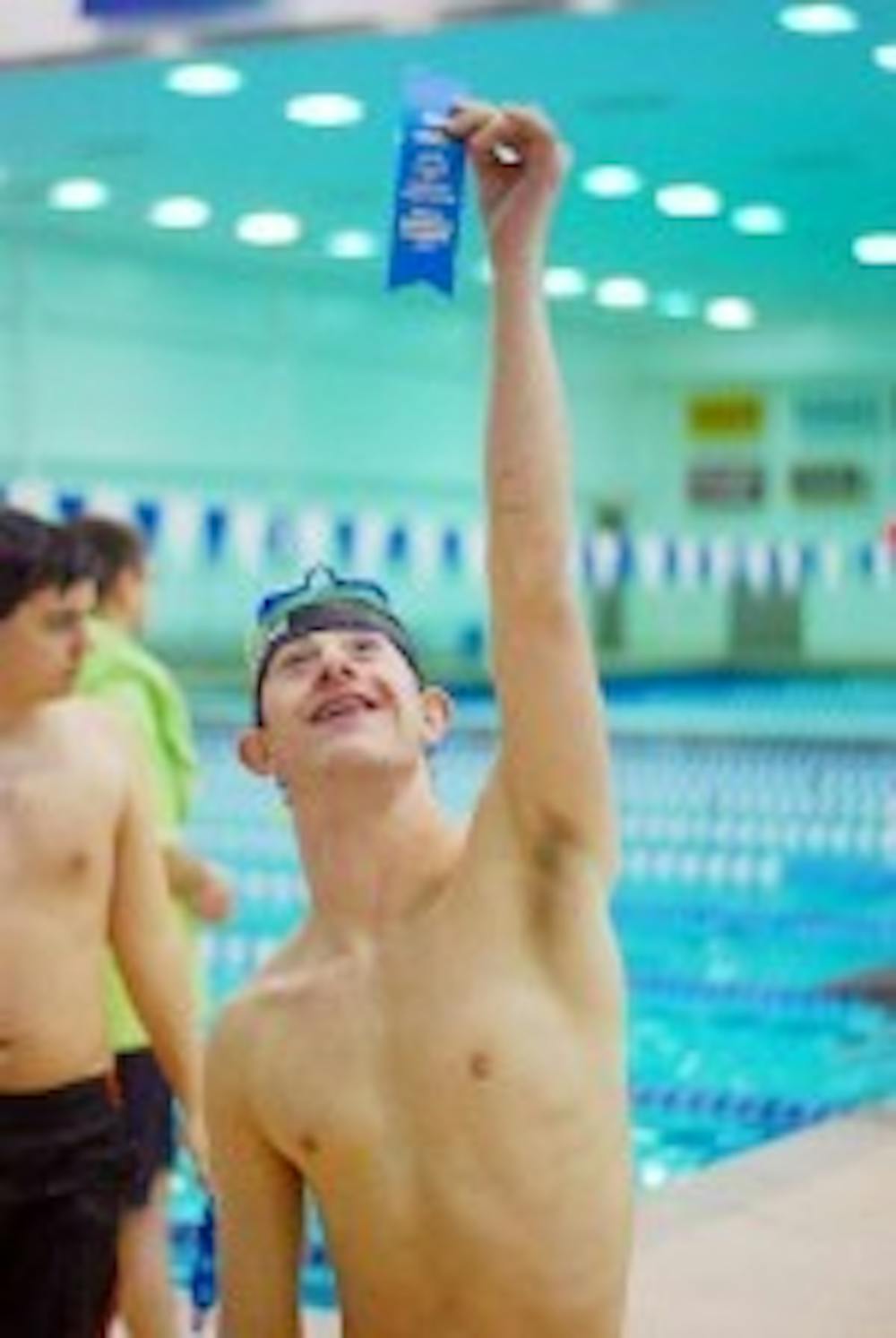Kelly Haywood has been competitively swimming for 20 years. The Kenmore/Tonawanda swimmer has been a part of her Special Olympics team since she was 28 years old.
Eighty-five athletes ages 8 and up - including Haywood - crowded Alumni Arena's pool deck Saturday morning, ready to compete in the Western Region Special Olympics swim meet. Many of the athletes were prepared to compete in multiple races and had been preparing since October for their time in the pool. But the real mission of the meet was to demonstrate courage, experience joy and share in friendships and sportsmanship.
The New York Special Olympics was founded in 1969. It provides year-round training and competition in Olympic-style sports that fosters confidence and builds a positive self-image for children and adults with intellectual disabilities.
Haywood has participated in other Special Olympic sports but really enjoys swimming.
"[I like the] freestyle, backstroke and relays - all of them," Haywood said. "I used to do track and field, but I took a break from that. It was too much. I bowl. I just want to do my best and put my head in the water."
Carol Hetzelt has been helping her husband, Erwin, coach his Kenmore/Tonawanda Special Olympics team for the last 29 years. Her son, Eric, is an athlete on the team, but he was unable to participate this year due to a heart condition.
Carol said practices teach athletes skills like kicking in the water, holding their breath, strokes and how to use lane markers. She said many of the athletes have been working with their team for many years.
The meet included events such as the 100-meter freestyle and backstroke, 50-meter breaststroke and relays like the 4x25 meter relay and 4x50 meter relay. There were also events for the adaptive and developmental athletes, such as the 10-meter assisted swim and the 15-meter walk.
"We want the kids to go and have fun, learn to work as a team and help each other," Hetzelt said. "They cheer on each other - that's really what this is all about. You want them to succeed and you want them to feel really good about themselves. We never put them in anything that they're not going to succeed in. So if we think that they're not going to be able to do a 50-meter, we'll put them in the 25 [meter race] so that they have a better chance of finishing and feeling good about themselves."
Erwin said prior to coaching his Special Olympics team, he coached two of his daughters on an elementary school team. Erwin would bring his son to the school with him, and Eric swam with his sisters in the pool. Erwin and Carol worked with the town of Tonawanda during its handicapped recreational swim time to start a program for Special Olympics swimmers.
"The smiles on their faces - that's more than any dollar amount that you could ever get," Erwin said. "Just seeing the satisfaction and the looks on their faces as they compete and how they finish. I've always been a big believer, even when I coached in a grammar school league, that if you're not having fun doing this, then you shouldn't be doing it. A lot of coaches don't believe in that, but I do."
As a nonprofit organization, Special Olympics New York serves over 61,000 athletes free of charge, according to its website. It is the largest Special Olympics program in the United States and the sixth largest program in the world. Dan Kuberka, director of program for the western region, said athletes can compete in any events they choose and are divided into groups so athletes can compete against people of like abilities.
Kuberka said the meets are real competitions for athletes. He said the Special Olympics is a chance for athletes to train for physical fitness with different people and develop camaraderie with teammates, volunteers and coaches, while developing relationships throughout the community.
Volunteers from the Buffalo area coach the athletes at seven different training clubs. At least once a week for about an hour, the coaches teach different strokes, different races and different distances to the athletes.
The goal is to enjoy the sport and to see good competition, Kuberka said.
"We want to see sportsmanship," Kuberka said. "The athletes have a code of conduct to be good sports. We want them to have fun. Sports, at the end of the day, are supposed to be fun. Even though it's training and competition, you want them to have a good time."
Grand Island coach Vaughn Keller got involved with Special Olympics when his son Bill became an athlete. Keller believes the meets give the athletes a chance to participate with their peers. He believes it builds friendships, while athletes also have fun and work hard.
"[I hope everyone is] having a good time and doing the best that they can," Keller said. "It's what we strive for, and [we] try to make sure they try hard ... They don't always win, so it's them understanding that as long as they try hard, it's good."
Email: features@ubspectrum.com





